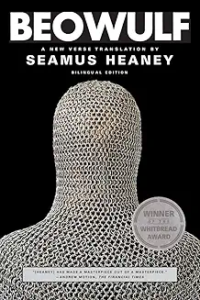Beowulf translated by Seamus Heaney 1999
I have intended to read Heaney’s translation of Beowulf since it was published 26 years ago, and being in England seemed to be the right time. Only after finishing this 3182 line alliterative poem, did I realize that it was about a Scandinavian/German epic warrior not a Brit and had been translated by an Irish poet who refused to be knighted by the Queen because he did not consider himself British.
Nonetheless, I did read it in Heaney’s translation which won a number of awards, and I did finally add this epic poem to my previous reading of the other great epic poems, the Iliad, Odyssey, and Aeneid.
First the poem and then the poet. While there continues to be debate about the timing and origin of Beowulf, the current consensus favors it having been written around 1000 CE, in Old English, and comprising a combination of ancient fables and actual historical events. There are many allusions to the Bible—Cain and Abel, Noah, and many references to the Almighty. Whether these were original or added later is unclear since the events took place in a pagan land at a time well before widespread Christianity.
The story concerns a Gaet warrior, the eponymous Beowulf, who travels to Denmark to rid the Danish king of the monster, Grendel who has been eating the king’s warriors. Beowulf kills Grendel and then his avenging mother and becomes king of the Gaets. Much honored for his wisdom and courage, he rules for 50 years of peace and abundance. He dies when he battles yet another monster, a fire-breathing, flying dragon who had been guarding an underground cave filled with gold and other treasures. Beowulf’s wishes are fulfilled when his funeral pyre is set aflame and a barrow to his memory is raised where sailors will see it. After his death, the Gaets, Danes, Swedes, and Fresians return to their warring ways.
The epic poem has been translated by many scholars beginning in 1805, but Heaney’s version is often cited as the best, combining modern language with the Old English. It won the Whitbread Award in 1999. Heaney, who spent years in Cambridge, Massachusetts while a professor and later University Poet at Harvard, won the Nobel Prize in 1995. He has been called the greatest Irish poet since Yeats by Robert Lowell and ‘probably the best known poet in the world’ upon his death by The Independent. He died in 2013 at the age of 74 from a fall after he had a stroke.
I’m glad I read this epic poem as a way of rounding out my literary education, but you’d have to be a hard core English major for me to recommend it to you. There’s lots of sword play and dragon killing, but the unpronounceable Danish and Old English names in this translation from the Late West Saxon dialect of Old English make it a bit of a rough go. The only extant copy of the poem, the Nowell Codex written in ink on parchment, is in the British Library, not three miles from where I sit typing. Perhaps a visit to the Codex will inspire me to urge further readers to undertake Beowulf.



